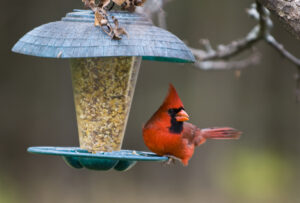 Not all birds fly south for the winter. The ones that stay up north face a tough few months once the weather gets colder. Most of their natural food supply has been exhausted, and insects have died or gone into hibernation.
Not all birds fly south for the winter. The ones that stay up north face a tough few months once the weather gets colder. Most of their natural food supply has been exhausted, and insects have died or gone into hibernation.
As we’ve said before, birds are beneficial animals, helping pollinate our flowers and feeding on potentially harmful insects. And backyard birds rely on us to help them get through the winter. You see a birdfeeder in your yard, they see a port in a storm.
With that in mind, here are a few types of birdseed New Jersey birds will enjoy feasting on this winter.
Black-oil sunflower seed
Bird Watchers Digest calls this the “hamburger of the bird world,” in that pretty much any bird who visits your feeder will want to eat it. Birds enjoy the easy-to-crack shell, and the kernel inside is larger than what you’d find inside striped sunflower seeds.
Peanuts
Birds like peanuts as much as we do. It’s full of protein, and popular with jays, chickadees, titmice, woodpeckers, cardinals and finches. Just remember that peanuts can carry harmful aflatoxins if they get wet, and can potentially attract unwanted animals – bears, deer, raccoons. If you plan to serve your birds peanuts, use smaller amounts and keep them dry.
Cracked corn
This food is popular with jays, doves, sparrows, blackbirds and quail. However, the warnings we gave with peanuts apply to corn as well: it develops aflatoxins if it gets wet, and it can attract more than just birds.
Suet
Birds need fat in the winter, and suet is an excellent source. If you can’t find suet, ask the butcher at your local grocery store. And if you don’t have a suet feeder, you can just serve it in a mesh onion bag.
Fruit
A number of birds enjoy dried fruit and raisins, including robins, Baltimore orioles, eastern bluebirds and waxwings. But birds will also eat fresh fruit slices if you serve them.
Safflower
These seeds have thick shells, and are popular among chickadees, doves, grosbeaks and native sparrows. Take care to keep it inside your feeder dry during wet winter weather. It can become soggy and inedible. There’s a debate about what birds will or won’t eat it. Some say house sparrows and blackbirds aren’t fans of safflowers. You may just need to see for yourself.
Mixed seed
Bird Watchers Digest makes the distinction between good and bad mixed seed. The bad version can include wheat, dyed seed that’s only meant for pet birds, and red milo, which is something only birds in the southwest seem to eat. Good seed includes a lot of sunflower seed, cracked corn, white proso millet and peanuts. It’s what you’ll find at specialty bird stores or hardware/feed stores.
Nyjer/thistle
Nyjer is a trademarked name, and was initially called “Niger seed” after the African nation where it originated. It’s also called “thistle,” although it’s not related to thistle plants. But no matter what you call it, these seeds are a favorite of American goldfinches, lesser goldfinches, pine siskins, indigo buntings and common redpolls.
Mealworms
According to Bird Watchers Digest, most feeder birds will eat mealworms if they’re on the menu. You can get these worms from bait shops, or order them by the mail. And the name is a misnomer: mealworms are actually larval beetles.
Homemade bird treats
Another Bird Watchers Digest suggestion, these homemade treats can be something as simple as spreading some peanut butter onto a tree trunk. You can also try something a little more complicated: melt suet in your microwave, and pour it into an ice cube tray. Before it hardens, add bits of peanuts, fruits, or other bird foods, let it freeze, and serve the birds some cubed bird treats.
Remember to keep bird feeders at different levels of your yard to attract a variety of birds. Some birds feed in trees, others near the ground, others in shrubs.
At Mendham Garden Center, we offer bird feeders designed for specific types of birds, and four varieties of bird seed mixes.
Contact us today or visit one of our three locations, and we’ll help make sure your backyard birds have a healthy winter.
